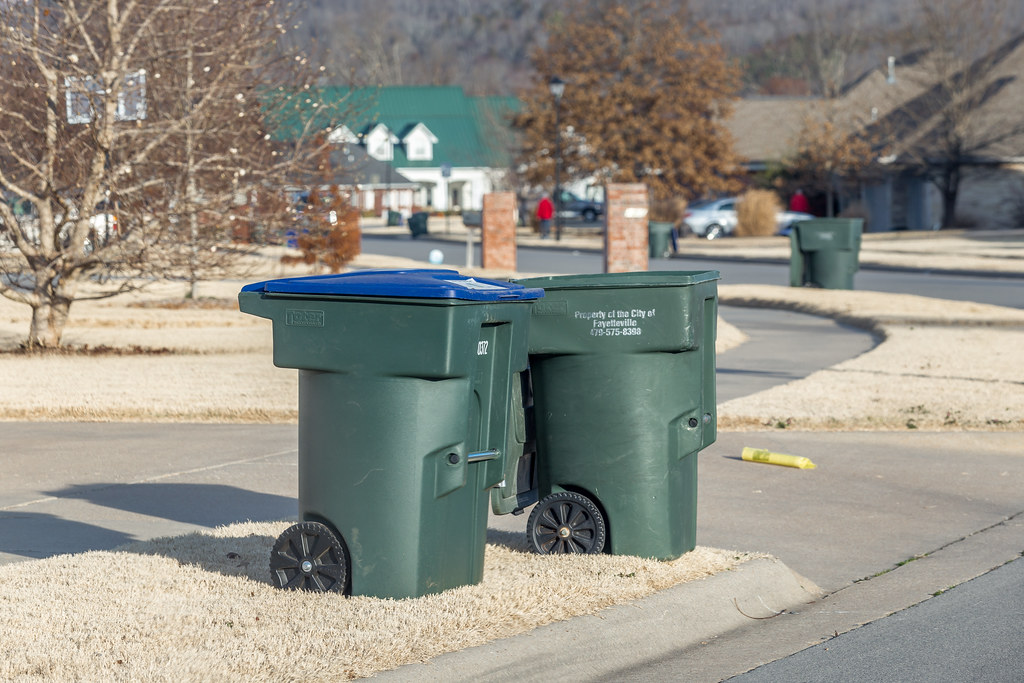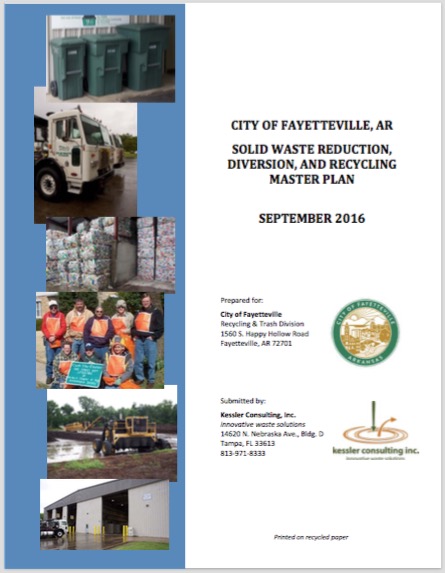
Residents on South River Meadows Drive were some of about 1,000 people who were given 64-gallon carts with alternate blue lids as part of a three-month-long pilot project to test the idea of single-stream recycling in Fayetteville.
Photo: Todd Gill, Fayetteville Flyer
Fayetteville officials are getting their first look at what it will take to increase the city’s trash diversion rate from 18 to 80 percent.
A newly completed trash reduction, diversion and recycling master plan reiterates what consultants have said all along: It’s an extremely ambitious goal.
Members of the City Council’s Water, Sewer and Solid Waste Committee this week heard from Mitch Kessler and Robin Mitchell from Kessler Consulting, who outlined the ways in which Fayetteville could reach its goal by 2025.
The city hired the Florida-based waste management company last year after the council passed a resolution in 2013 aimed at attaining a city-wide solid waste diversion rate of 80 percent.
At the time, Kessler and Mitchell said while achieving the goal is possible, it will require fundamental changes in the city’s approach to recycling.
“It’s completely flip-flopping your system,” said Mitchell. “And that is a huge undertaking.”
The findings of the group’s year-long study, which concluded with a 111-page master planning document, certainly backed up those initial statements.
Last year, the city received about 85,000 tons of waste. Of that total, only 5,900 tons were recycled and 6,900 tons were composted. That left about 72,000 tons of waste which was sent to the Eco-Vista Landfill in Tontitown.
The study found that progressing from 18 percent to 80 diversion – or even to 50 percent diversion – in the next 10 years will require new policies, programs, and facilities.
The plan suggests implementing those changes in phases, including taking two recently completed pilot programs to a city-wide level.
A commercial food waste pilot program that ran from January to June collected about 69 tons of food waste, and included six restaurants, the city’s senior center, Happy Hollow Elementary School, and four locations at the University of Arkansas.
By using a modified microbial inoculant approach to composting, the city was able to create marketable compost at speeds of up to 66 percent faster than the traditional turned window method it uses for yard waste composting.
Capturing commercial and residential food waste that is currently landfilled could increase the city’s diversion rate by up to 11 percent, the data suggests. Including other organic materials such as low-grade paper in the recovery program, the study found, could divert up to an additional 6 percent.
A residential single-stream recycling pilot was conducted for 14 weeks at about 1,000 households in southeast Fayetteville, and for 12 weeks at two separate apartment complexes.
Under a single-stream program, all recyclables are still placed into one bin, but instead of a city worker sorting the materials at the curb, the entire contents of the bin are emptied into a truck to be transported and sorted at a facility.
The program saw an 89 percent reduction in time spent at each household, and netted a 94 percent increase in curbside tons collected per week. According to the firm’s data, those numbers are consistent with reported increases in various other communities that have converted to single-stream recycling.
Capturing recyclable materials that are currently landfilled has the potential to increase the diversion rate by another 20 percent, the report stated. However, a single-stream program would require construction of a new processing facility that could cost up to $3.86 million plus operating costs.
Reaching the city’s goal will also require other measures, including recovery of debris disposed in roll-off waste containers used by development companies when constructing new homes and buildings around town. According to the report, approximately 15,000 tons of construction debris and other bulky wastes were collected and landfilled by the city in 2015. Kessler said at least 70 percent of that material could potentially have been recycled.
Success may also hinge upon partnerships with other cities.
Kessler said one way to reach and sustain such a high diversion rate is by working with a private waste management company to provide the necessary infrastructure to handle the increased amount of recyclable material. However, he has said that Fayetteville can’t do that alone.
“The bottom line is you don’t really have enough waste here to get the private sector that excited,” Kessler told a group of residents at a public meeting in April 2015.
The City Council is scheduled to discuss the plan at its Dec. 6 meeting.


